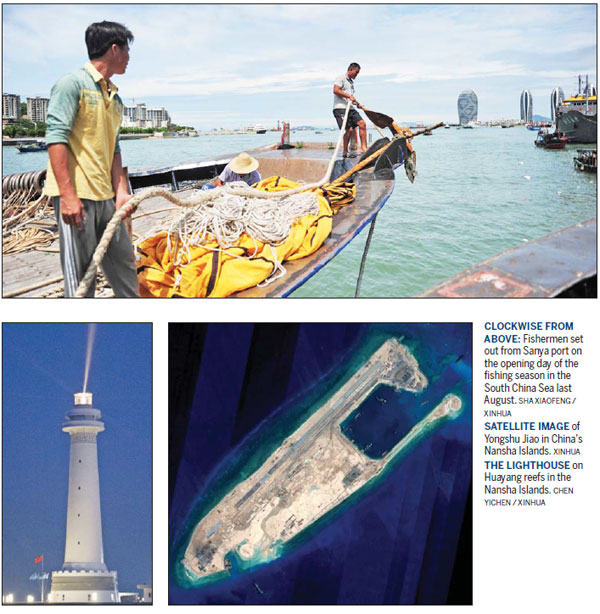Experts issue call for Manila to negotiate

Experts in international law from around the world have urged the Philippines to return to the negotiating table with China to solve the South China Sea issue in a reasoned and peaceful manner.
They spoke after a seminar found that any verdict delivered by an arbitration tribunal based in The Hague will have no legal validity because China and the Philippines have not reached any agreement to authorize it to intervene in the dispute.
The tribunal under the auspices of the Permanent Court of Arbitration is thought to be close to issuing a ruling on arbitration launched unilaterally by Manila.

The tribunal has been established under appendix 7 of the United Nations Convention on the Law of the Sea.
The experts, some of whom helped draft the convention, discussed the case at a seminar on South China Sea Arbitration and International Rule of Law. It was organized by Leiden University's Grotius Center for International Legal Studies and Wuhan University's Institute of Boundary and Ocean Studies.
The experts say the court has no jurisdiction over a sovereignty dispute under the framework of the convention.
"China has taken the right stance of nonparticipation and non-acceptance in the dispute arbitration, which has been stirred up mainly due to the geopolitical strategy of another power in the region," says Abdul Koroma, former judge of the International Court of Justice, the principal judicial organ of the United Nations based in The Hague.
Koroma, a former Sierra Leone ambassador to the UN and the European Union, says the court had not obtained agreement from the parties concerned to conduct the arbitration, which is a required precondition under United Nations law.
He says only the Philippines has filed the arbitration case, meaning that it is one-sided and that the authority required to accord with international law is lacking.
At the seminar, many experts voiced opposition to the United States, which is not directly involved in the South China Sea issue, supporting the Philippines in the region to achieve Washington's foreign policy goal of realizing a strategic Asia-Pacific pivot by containing China.
Tom Zwart, a professor at Utrecht University's School of Law in the Netherlands, says, "the US should not get involved, because it is not a direct stakeholder in this issue. I suggest that this is an issue for the countries in the region to seek a solution through negotiation."
He says he does not mean to take sides in the dispute, but he insists the US should not use the rule of international law to serve its own foreign policy interests by boosting its strategic presence in the region.
"Instead, I believe the best way is to go back to the negotiating table in an Asian way," says Zwart, a former senior counsel for the Dutch deputy prime minister.
Historically, he says, China and other countries in the region have been able to resolve their differences in a way that is mutually agreeable, and will be able to do so in the future.
"Regarding the complexity of this dispute," he says, "with so many parties and interests involved, you could not deal with it within the framework of the UN Convention on the Law of the Sea because the treaty does not offer procedures to solve the problem. So China and its neighbors must sit down to discuss the solutions by themselves."
fujing@chinadaily.com.cn
(China Daily European Weekly 07/02/2016 page15)
Today's Top News
- Takaichi must stop rubbing salt in wounds, retract Taiwan remarks
- Millions vie for civil service jobs
- Chinese landmark trade corridor handles over 5m TEUs
- China holds first national civil service exam since raising eligibility age cap
- Xi's article on CPC self-reform to be published
- Xi stresses improving long-term mechanisms for cyberspace governance






























